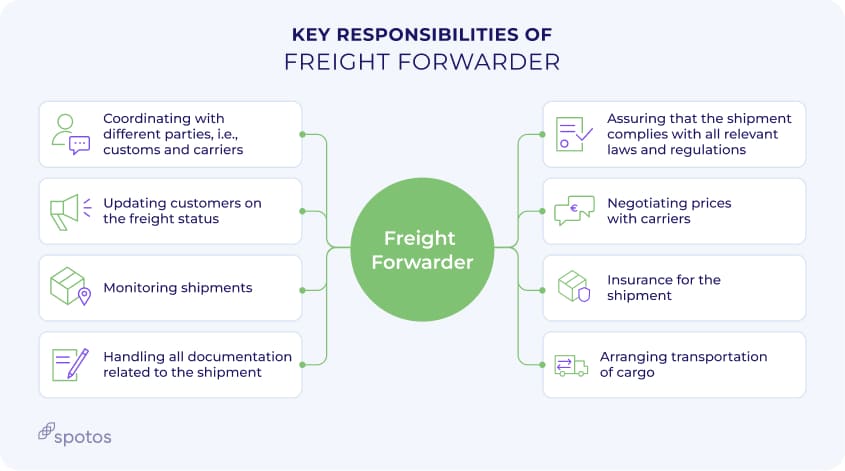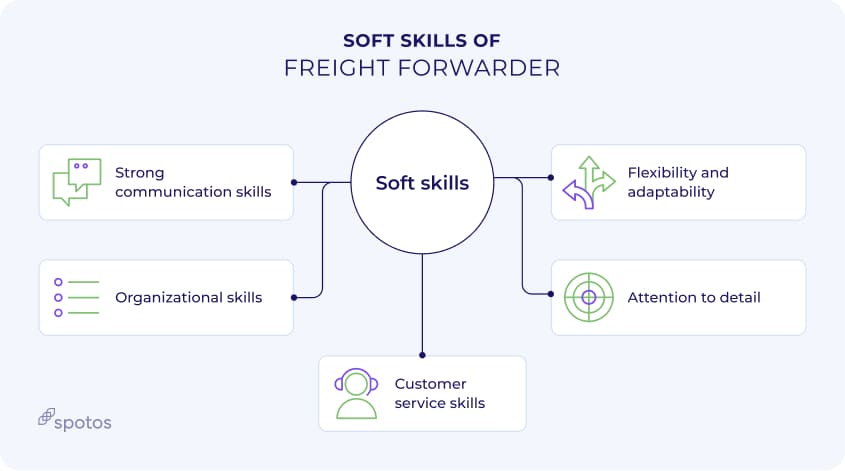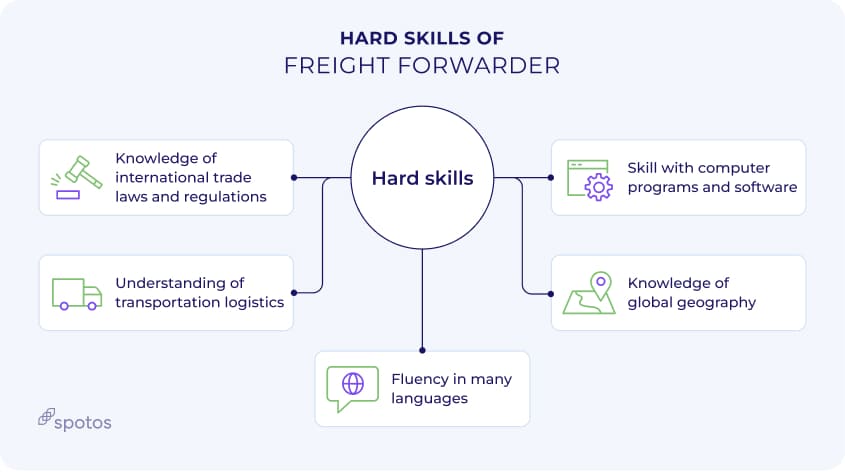Freight forwarders are the key players in the logistics industry (Eurostat, 2021). They ensure safe and on-time goods delivery. If you want to become a freight forwarder, please read the step-by-step guide, which helps you understand the process of becoming a licensed freight forwarder.
What is a freight forwarder?
A freight forwarder is a company that organizes the shipments of goods on behalf of its customer. It is like a freight broker but provides extensive services. They are responsible for ensuring safe, secure, and on-time goods distribution. Freight forwarders have a network of contacts in different industries, such as manufacturers or transport companies, that they can rely on to get the job done.
What are the duties of a freight forwarder?
Freight forwarders have many different functions to carry out. First of all, they are third-party service providers. Their primary responsibility is to manage international shipping between locations through asset-based transport companies. Here are the most common freight forwarder duties.
- Arranging transportation of cargo
- Monitoring shipments
- Updating customers on the freight status
- Coordinating with different parties, i.e., customs and carriers
- Handling all documentation related to the shipment
- Assuring that the shipment complies with all relevant laws and regulations
- Negotiating prices with carriers
- Insurance for the shipment
- Storage solutions for goods
Things to consider before becoming a freight forwarder
There are several things to consider before becoming a freight forwarder, including the following (BIFA, 2020):
- Importance to understand the market and the services you plan to offer
- The necessity to establish relationships with partners such as carriers and customs brokers
- It’s essential to have a strong understanding of international trade laws and regulations
- Ability to navigate complex paperwork and documentation
- Capacity to manage goods transportation, which can be demanding and time-consuming
- Strong communication and organizational skills to coordinate shipments
- A solid business plan, including a marketing and advertising budget
- Consider the potential costs associated with becoming a freight forwarder
Becoming a freight forwarder requires industry knowledge and strong organizational and communication skills. It can be a demanding but rewarding career for those up to the challenge.
Freight forwarding requirements
To become a freight forwarder, you must have a combination of education, training, and experience in the field. Specific requirements can vary depending on the country where you seek to become a freight forwarder. However, the following steps can help you get started:
- Relevant degree or certificate. Many freight forwarders have a college degree in a field such as logistics, supply chain management, or international business. Also, you can get a certificate from a specialized freight forwarding training program, providing you with the knowledge and skills you need to succeed in the field
- Gain experience. Many companies ask freight forwarders to have experience in the field before considering hiring them
- Get a license. In some countries or regions, freight forwarders must have a license or certification. To get a license, you may need to pass an exam or meet other requirements, such as completing a certain amount of training or experience
- Stay current. The field of freight forwarding is evolving, so it is important to stay current on industry trends and developments. This may include attending conferences, continuing education courses, or joining professional organizations
What do I need to become a freight forwarder?
An excellent freight forwarder must contain not only education or experience in the industry but also:
- Specific qualifications
- Emotional intelligence
- Soft skills
- Hard skills
Soft skills
Recently, emotional intelligence has taken all prize in HR heads. Also, soft skills are becoming the key to success in many industries. The transport industry is not a stranger. Freight forwarders and freight brokers must get strong communication and interpersonal skills. They should build and maintain relationships with clients and industry partners. Also must be equipped with excellent organizational and time management abilities. Other important skills include:
- Strong communication skills
- Organizational skills
- Strong organizational skills
- Attention to detail
- Flexibility and adaptability
- Customer service skills
Hard skills
Besides soft skills, several hard skills can be helpful for a career as a freight forwarder or freight broker, including the following:
- Knowledge of international trade laws and regulations
- Understanding of transportation logistics
- Skill with computer programs and software
- Knowledge of global geography
- Fluency in many languages
Finally, the mentioned skillset can be valuable for a successful freight forwarder or broker career.
Qualifications
There is no specific educational need to become a freight forwarder. Many people in this field have a logistics, transportation, or international business background. In some cases, on-the-job training and experience can be enough to begin a career as a freight forwarder. In addition, a college degree or professional certification can help establish credibility and expertise. Several professional organizations offer certifications for freight forwarders, such as the International Federation of Freight Forwarders Associations (FIATA) and the International Air Transport Association (IATA).
What licenses are required for freight forwarders?
The licenses required to work as a freight forwarder can vary depending on the country or region where you operate (Unece, 2014). In some cases, no freight forwarder license is required; in others, freight forwarders may need a license or certification to operate in the market. Generally, it’s always a good idea to consult with a legal advisor to ensure you follow all applicable laws and regulations.
Freight forwarders licenses in the EU
In the European Union, freight forwarders must be registered with the national customs authority in the country where they are based. This involves completing an application and providing certain information, such as the name and address of the company, the names of the owners and directors, and details about the services that will be provided.
In some cases, freight forwarders may also need more licenses or certifications to provide certain services. For example, freight forwarders who handle dangerous goods may need a license from the competent national authority in the country where they are based. In addition, freight forwarders who operate bonded warehouses may need a license from the customs authority.
Freight forwarders licenses in the UK
In the UK, freight forwarders must have a license from the UK government’s Department for Transport. This international freight forwarding license allows freight forwarders to provide services such as customs clearance, cargo transportation, and warehousing for international shipments. To get this license, freight forwarders must meet certain requirements and pass a licensing exam.
Becoming a licensed freight forwarder
Acquiring a freight forwarder license could be clumsy in Europe and vary depending on your country. Yet, in general, the following steps may be involved:
- Research the regulations and requirements for freight forwarders in the country where you want to operate
- Meet the requirements for obtaining a license, which may include having a certain amount of experience in the industry, passing a licensing exam, and having adequate insurance coverage
- You can apply for a license from the relevant government department and any supporting documents and fees.
- Wait for your application to be processed and reviewed. This can take several weeks or months, depending on the country and the number of applications processed
- If your application is approved, you will be granted a license to become a freight forwarder. You will then be able to provide services such as customs clearance, cargo transportation, and warehousing for international freights
The requirements and process of acquiring a freight forwarder license could be tricky, so it’s important to research the specific regulations where you want to operate.
What are the costs of becoming a freight forwarder?
The costs of becoming a freight forwarder can vary depending on specific requirements for obtaining a license to operate as a freight forwarder. In general, there may be several expenses involved in becoming a freight forwarder, such as license application fees. Often, you will need to pay a fee to apply for a license to operate as a freight forwarder. This fee can vary depending on the country and the type of license you are applying for.
- Exam fees. Sometimes, you may need to take a licensing exam to become a freight forwarder. This exam may have a separate fee that you will need to pay
- Insurance expenses. As a freight forwarder, you must have adequate insurance coverage to protect yourself and your business. The cost of this insurance can vary depending on the type of coverage you need and the risks involved in your business
- Training expenses. Sometimes, you may need the training to become a licensed freight forwarder. This training can be classroom instruction, online courses, or on-the-job training, and it may have associated expenses
- Ongoing fees. Besides the initial expenses of becoming a freight forwarder, there may be ongoing fees that you need to pay, such as annual license renewal fees, fees for maintaining insurance coverage, and other expenses associated with running your business
It’s important to research the specific regulations and requirements in the country where you want to operate to get an accurate idea of the expenses involved. Also, it may be helpful for you to contact the relevant government department or industry association for more information on the expenses of becoming a freight forwarder.
Frequently Asked Questions
Becoming a freight forwarder is an easy process. It still requires discipline and dedication. The process for obtaining a freight forwarder license can vary depending on the country you are in. In general, the following steps may be involved:
Research the regulations and requirements for freight forwarders in the country where you want to operate. This will involve obtaining a license from the government’s transportation or logistics department. Meet the requirements for obtaining a license, which may include:
- having a certain amount of experience in the industry
- passing a licensing exam
- having adequate insurance coverage
You can apply for a license from the relevant government department and any supporting documents and fees.
Wait for your application to be processed and reviewed. This can take several weeks or even months, depending on the country and the number of applications processed.
If your application is approved, you will be granted a license to operate as a freight forwarder in the country. You will then be able to provide services such as
- customs clearance
- cargo transportation
- warehousing for international freights
The requirements and process for obtaining a freight forwarder license can vary depending on the country you are in. Hence, it’s important to research the specific regulations where you want to operate.
Yes, there is generally a demand for licensed freight forwarders. Freight forwarding is a critical part of the global supply chain, and licensed freight forwarders play a key role in facilitating the movement of goods across international borders.
As global trade continues to grow and evolve, the need for licensed freight forwarders will likely increase. With the right skills and expertise, a licensed freight forwarder can offer valuable services to businesses and individuals involved in international trade, such as customs clearance, cargo transportation, and warehousing.
The amount of time it takes to become a licensed freight forwarder can vary depending on several factors, including the specific requirements of the country or region in which you seek to become licensed. Yet, becoming a licensed freight forwarder can take several months to complete. This may include completing relevant training and education courses and passing required exams or assessments. It is also important to note that some countries must freight forwarders to have a certain amount of experience in the field before they are eligible for licensing.
Freight forwarding can be stressful, as it often involves coordinating the movement of goods across international borders. You must ensure that cargo arrives at its destination on time and in good condition. This can involve working with many stakeholders, including:
- clients
- carriers
- customs officials
A wide and complex network impacts decisions in a fast-paced environment. Besides, freight forwarders may face tight deadlines and pressure to cut costs and maximize efficiency. As a result, the job can be challenging and demanding at times of property damage. Yet, for individuals who are organized, detail-oriented, and able to think on their feet, a career in freight forwarding can also be rewarding and fulfilling.
There are several steps you can take to find the best shipping rates for the shipping company:
- Shop around. Compare rates from many carriers to find the best deal. Please go with something other than the first offer you receive. Take your time to research and compare rates from different carriers. Make sure you are getting the best value for your money.
- Negotiate. Feel free to negotiate with carriers to get a better rate. They may be willing to offer a discounted rate, particularly if you are a regular customer or have a large cargo volume.
- Use technology. Take advantage of technology to help you find the best rates. Many online tools and platforms allow you to compare rates from different carriers. Find the most cost-effective pricing option.
- Consider other factors such as transit time, reliability, import processes, and the services they offer. Make sure to take these factors into account when deciding which carrier to use.
- Build relationships. Develop relationships with carriers and other partners in the supply chain. This can help you get better rates and more flexible terms in the future.



